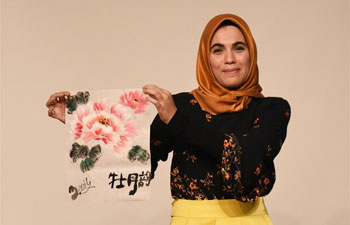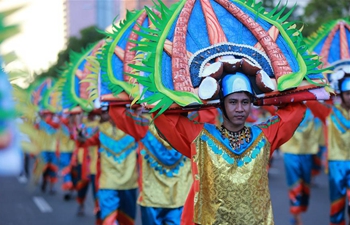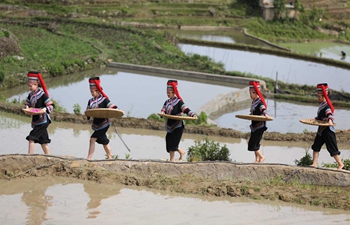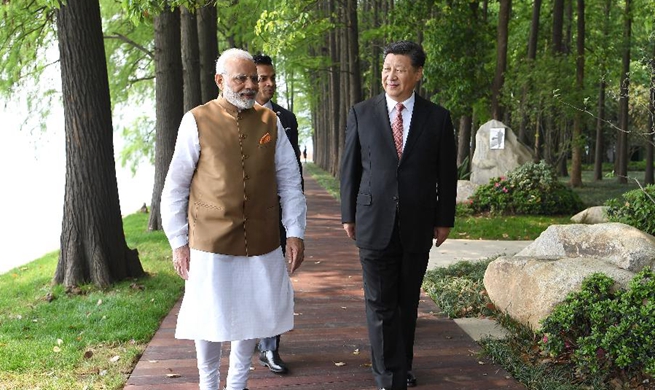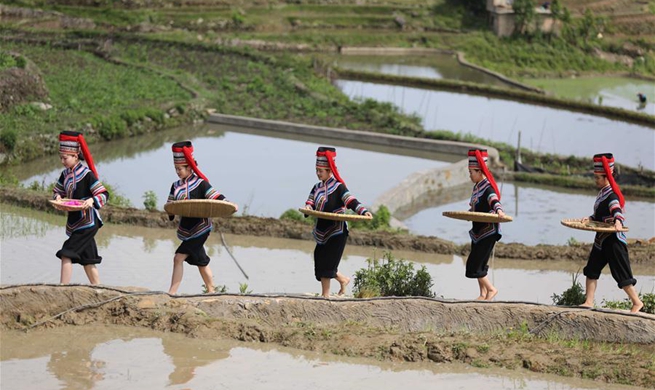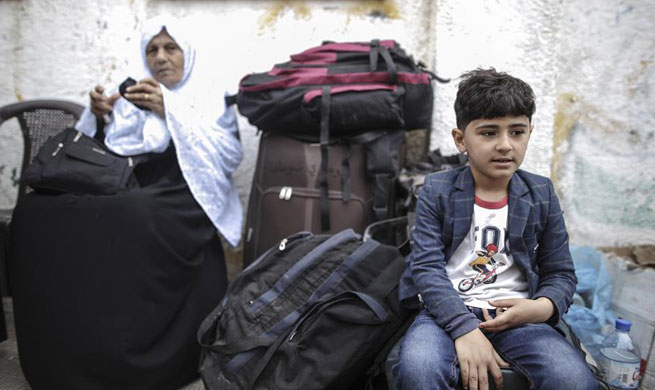URUMQI, April 29 (Xinhua) -- Mamet Nurobolesen's family in farwest China has kept their promise to protect their motherland for four generations.
Living under Muztagata, a mountain close to China's northwest frontier in Xinjiang Uygur Autonomous Region, 17 people from this Kirgiz herding family have held the role of civilian border patrol guards over the last 68 years to fulfill their oath to defend the country's borderline.
Polmo Dyulyut, Mamet's grandfather, joined one of the country's first civilian border patrols in 1950s.
"As long as we are here, the border will never be moved by even a millimeter. We will keep it safe," vowed Polmo.
That oath has been passed down from generation to generation due to the Kirgiz tradition of following the commands of elders.
The 4,100-meter-high plateau is so scarcely-populated that when the People's Republic of China was founded there were only three or four households living in Muzukoro, a mountain pass in Kizilsu Kirgiz Autonomous Prefecture which leads to Tajikistan, Afghanistan, and Pakistan.
To better safeguard the prefecture's 1,133-km-long border, local families like Mamet's were commissioned to help PLA soldiers patrol the 47,000-square-kilometer border area while grazing their livestock.
A FAMILY RELAY
Mamet's father Obulu Esen became a patrol guard in 1952, but retired 28 years later due to ill health.
The role was then passed to Mamet's older brother Tajden Opol. Moving to the unpopulated border area, the then 17-year-old was alone in dealing with solitude, danger and blizzards.
When he was on duty Tajden could only visit his family once a month. Once, he couldn't take the solitude and returned home. But the minute he arrived he received a beating from his father.
Tajden was kicked out of house and had to return to his post in the mountains.
Mamet was just 12 the first time he joined his father and brother on a patrol.
"That trip taught me the meaning of the words border and motherland," Mamet said.
During that patrol Obulu taught his young son poems about the legendary Kirgiz hero Manas.
"Gobi sand became stones. On the stones grew the forest. Pastures changed into beaches. The rocks in the rivers were washed away. Everything is changing. What remains constant is the teachings of our ancestors, which are passed down from generation to generation," Obulu recited.
The father told his son that the Kirgiz people are the descendants of Manas.
His father's words took root in Mamet's heart. When it was his turn to become a patrol guard in 1997, he wept with mixed feelings.
"It's been a dream of mine since childhood to become a guard. But when it was finally my turn, I felt that I had robbed my brother of this most precious duty. I felt sad," the 42-year-old man recalled.
"Grandfather always said that the best quality of our people is our loyalty to our country. This tradition lives on with us," he said.
Among the less than 200,000 Kirgiz people who make up around one-third of the prefecture's population, there are more than 10,000 civilian guards like Mamet patrolling near the border, risking their lives every day on the rugged mountain paths.
A TOUGH JOB
The Kirgiz word Muzukoro means icy shack. The name is justified as locals need stoves to keep warm all year round.
"To tell the truth, life here is really tough," Mamet said.
Due to the changeable weather and lack of oxygen at high altitude, almost all of the patrol guards suffer from migraines, heart problems, and arthritis. They said they regularly get frostbite and start to lose teeth in their 20s.
Mamet has had arthritis for over a decade. As his legs have gotten worse in recent years, he started to fear that his days of patrolling might soon come to an end.
He is often asked why he doesn't leave, to which he replies, "this is my home."
Every day Mamet carries some bread and a bottle of milk tea, and when he is thirsty he eats snow.
Patrolling the mountains for more than 20 years, Mamet knows every valley and peak. He can tell the story of how he gained each scar on his body.
In 2002, his foot was badly cut by a sharp stone when he was climbing up a cliff in the winter. At first he didn't take it seriously, but eight days later the wound had festered and he had to leave to find a doctor.
The infection might have killed him, said the doctor, who cleaned the gravel out of the wound and put five stitches on it. It took a month for Mamet to recover.
The guards' shoes wear out easily. Mamet and his colleagues weave shoe covers of yak wool, and burn worn shoes to keep warm.
The main mission of this civilian force is to prevent illegal border crossings.
As head of the patrol team, Mamet has divided the team into four shifts, five people patrol along the border, five across the whole area, five watch at checkpoints, and three graze their flock.
In December 2015, local police received information that two suspected terrorists were about to escape through Muzukoro. Mamet joined the manhunt. He climbed mountains and cliffs and found footprints. The suspects were arrested thanks to Mamet's help.
"During the search I was afraid, but it's my job," Mamet said.
His wife Bujanat Kamal doesn't sleep well and checks her phone often when Mamet is on patrols. She is sometimes so worried that she asks to go with him.
A truck overturned in the mountains in December 2016 and Mamet went to help with the rescue. Bujanat went with him. The 20-km-long road was icy and it took them three hours to drive to the accident site.
They rescued the five people from the truck, but Bujanat caught acute bronchitis and was hospitalized for 20 days. Mamet asked for a month's leave to take care of her. It was his longest ever leave request. However, he received an urgent order and had to return to the mountains before Bujanat was discharged.
"Safeguarding the border is defending our homeland," he said.
The government raised the monthly subsidy for each civilian guard from 100 yuan (15.8 U.S. dollars) to 2,600 yuan last year, and provided them with motorcycles. It also built new homes for their families and provided free schooling for their children.
Mamet has now been joined by the next generation, his nephew Abudukerim Miman. He son also wants to be a soldier or guard when he grows up.






